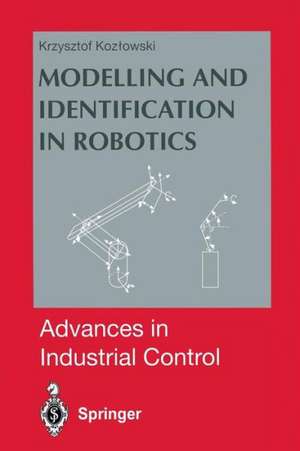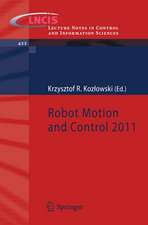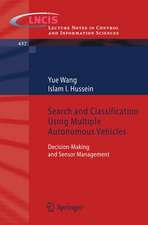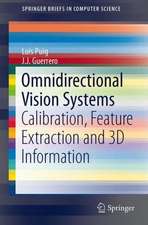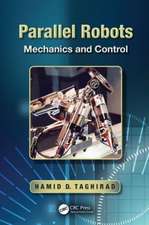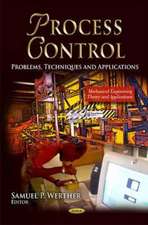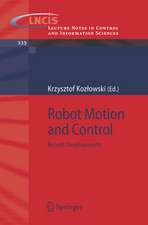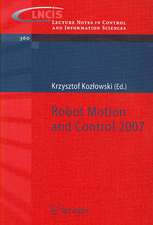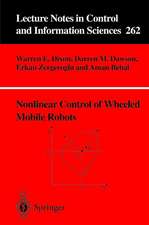Modelling and Identification in Robotics: Advances in Industrial Control
Autor Krzysztof R. Kozlowskien Limba Engleză Paperback – 11 oct 2012
| Toate formatele și edițiile | Preț | Express |
|---|---|---|
| Paperback (1) | 640.24 lei 6-8 săpt. | |
| SPRINGER LONDON – 11 oct 2012 | 640.24 lei 6-8 săpt. | |
| Hardback (1) | 646.43 lei 6-8 săpt. | |
| SPRINGER LONDON – 25 mar 1998 | 646.43 lei 6-8 săpt. |
Din seria Advances in Industrial Control
- 15%
 Preț: 643.34 lei
Preț: 643.34 lei - 23%
 Preț: 582.63 lei
Preț: 582.63 lei - 18%
 Preț: 783.98 lei
Preț: 783.98 lei - 18%
 Preț: 947.35 lei
Preț: 947.35 lei - 20%
 Preț: 568.24 lei
Preț: 568.24 lei - 15%
 Preț: 643.16 lei
Preț: 643.16 lei - 18%
 Preț: 899.21 lei
Preț: 899.21 lei - 18%
 Preț: 891.33 lei
Preț: 891.33 lei - 18%
 Preț: 740.57 lei
Preț: 740.57 lei - 18%
 Preț: 961.23 lei
Preț: 961.23 lei - 18%
 Preț: 955.08 lei
Preț: 955.08 lei - 15%
 Preț: 645.28 lei
Preț: 645.28 lei - 15%
 Preț: 638.43 lei
Preț: 638.43 lei - 18%
 Preț: 901.11 lei
Preț: 901.11 lei - 18%
 Preț: 1410.94 lei
Preț: 1410.94 lei - 18%
 Preț: 728.91 lei
Preț: 728.91 lei - 20%
 Preț: 1003.77 lei
Preț: 1003.77 lei - 18%
 Preț: 947.35 lei
Preț: 947.35 lei - 15%
 Preț: 643.34 lei
Preț: 643.34 lei - 15%
 Preț: 654.30 lei
Preț: 654.30 lei - 18%
 Preț: 950.52 lei
Preț: 950.52 lei - 15%
 Preț: 644.30 lei
Preț: 644.30 lei - 18%
 Preț: 1393.09 lei
Preț: 1393.09 lei - 18%
 Preț: 950.21 lei
Preț: 950.21 lei - 18%
 Preț: 949.90 lei
Preț: 949.90 lei - 18%
 Preț: 949.42 lei
Preț: 949.42 lei - 18%
 Preț: 950.52 lei
Preț: 950.52 lei - 18%
 Preț: 1113.71 lei
Preț: 1113.71 lei - 15%
 Preț: 650.04 lei
Preț: 650.04 lei - 15%
 Preț: 644.95 lei
Preț: 644.95 lei - 18%
 Preț: 950.33 lei
Preț: 950.33 lei - 18%
 Preț: 948.61 lei
Preț: 948.61 lei - 18%
 Preț: 1112.60 lei
Preț: 1112.60 lei - 15%
 Preț: 644.63 lei
Preț: 644.63 lei - 18%
 Preț: 953.20 lei
Preț: 953.20 lei - 18%
 Preț: 945.62 lei
Preț: 945.62 lei - 15%
 Preț: 640.88 lei
Preț: 640.88 lei - 15%
 Preț: 640.88 lei
Preț: 640.88 lei - 20%
 Preț: 650.92 lei
Preț: 650.92 lei - 18%
 Preț: 1112.60 lei
Preț: 1112.60 lei - 20%
 Preț: 998.36 lei
Preț: 998.36 lei - 15%
 Preț: 643.34 lei
Preț: 643.34 lei - 18%
 Preț: 948.92 lei
Preț: 948.92 lei - 18%
 Preț: 1381.43 lei
Preț: 1381.43 lei - 15%
 Preț: 651.51 lei
Preț: 651.51 lei - 15%
 Preț: 647.08 lei
Preț: 647.08 lei - 20%
 Preț: 563.66 lei
Preț: 563.66 lei - 18%
 Preț: 998.03 lei
Preț: 998.03 lei - 18%
 Preț: 1225.79 lei
Preț: 1225.79 lei
Preț: 640.24 lei
Preț vechi: 753.22 lei
-15% Nou
Puncte Express: 960
Preț estimativ în valută:
122.54€ • 127.43$ • 102.54£
122.54€ • 127.43$ • 102.54£
Carte tipărită la comandă
Livrare economică 15-29 martie
Preluare comenzi: 021 569.72.76
Specificații
ISBN-13: 9781447111399
ISBN-10: 1447111397
Pagini: 292
Ilustrații: XXVI, 261 p.
Dimensiuni: 155 x 235 x 15 mm
Greutate: 0.41 kg
Ediția:Softcover reprint of the original 1st ed. 1998
Editura: SPRINGER LONDON
Colecția Springer
Seria Advances in Industrial Control
Locul publicării:London, United Kingdom
ISBN-10: 1447111397
Pagini: 292
Ilustrații: XXVI, 261 p.
Dimensiuni: 155 x 235 x 15 mm
Greutate: 0.41 kg
Ediția:Softcover reprint of the original 1st ed. 1998
Editura: SPRINGER LONDON
Colecția Springer
Seria Advances in Industrial Control
Locul publicării:London, United Kingdom
Public țintă
Professional/practitionerCuprins
1. Introduction.- 2. Robot hardware and programming software description.- 2.1 Introduction.- 2.2 General hardware description.- 2.3 General software considerations.- 2.4 Hardware description of an experimental set-up consisting of a one link geared robot.- 2.5 Further comments on the robot programming system.- 3. Robot dynamic models.- 3.1 Introduction.- 3.2 Derivation of the differential model.- 3.3 Derivation of the integral model.- 3.4 Comparison of the differential and integral models.- 3.5 Canonical models.- 3.6 Further comments on robot dynamics modelling for identification of their parameters.- 3.7 Examples of robot dynamics models for experimental identi-fication.- 4. Identification of robot model parameters.- 4.1 Introduction.- 4.2 Least squares technique for the differential model.- 4.3 Identification scheme for the integral model.- 4.4 Further comments on identification techniques used for estimation of robot dynamic parameters.- 4.5 Simulation results.- 5. Experimental identification of robot dynamic parameters.- 5.1 Introduction.- 5.2 Optimal trajectories for robot dynamics identification.- 5.3 Friction characteristics measurements for the integral model.- 5.4 Experimental identification results for the IRp-6 robot.- 5.5 Experimental identification results for a one link geared robot.- 5.6 Experimental identification results for the EDDA robot.- 5.7 Further comments on the experimental identification of robot dynamics.- 6. Load dynamics identification.- 6.1 Introduction.- 6.2 Mathematical description of load dynamic models.- 6.3 Exciting trajectories for load identification.- 6.4 Static load parameters measurements.- 6.5 Dynamic load parameters measurements.- 7. Hybrid control of the IRp-6 robot.- 7.1 Introduction.- 7.2 Different control algorithms for robots with position controllers.- 7.3 Local and global stiffness measurement of the IRp-6 robot.- 7.4 Experimental results.- 8. Concluding remarks.- References.
Textul de pe ultima copertă
As the use and relevance of robotics for countless scientific purposes grows all the time, research into the many diverse elements of the subject becomes ever more important and in demand. This volume examines in depth the most topical, complex issues of modelling and identification in robotics.
The book is divided into three main parts:
Advances in Industrial Control aims to report and encourage the transfer of technology in control engineering. The rapid development of control technology has an impact on all areas of the control discipline. The series offers an opportunity for researchers to present an extended exposition of new work in all aspects of industrial control.
The book is divided into three main parts:
- Robot dynamics modelling and identification of robot and load parameters, incorporating friction torques, discussing identification schemes, and presenting simulations and experimental results of robot and load dynamic parameters identification.
- A general concept of robot programming language for research and educational purposes is examined and there is a detailed outline of its basic structures along with hardware requirements, which both constitute an open robot controller architecture.
- A hybrid controller is derived, and several experimental results of this system are outlined.
Advances in Industrial Control aims to report and encourage the transfer of technology in control engineering. The rapid development of control technology has an impact on all areas of the control discipline. The series offers an opportunity for researchers to present an extended exposition of new work in all aspects of industrial control.
Caracteristici
Is topical and innovative - new identification schemes are proposed and new adaptive control algorithms are discussed * Is illustrated and reinforced throughout with experimental results, covering the practical as well as the theorteical Has a clear and accessible layout, dealing systematically with all the issues involved in the subject
